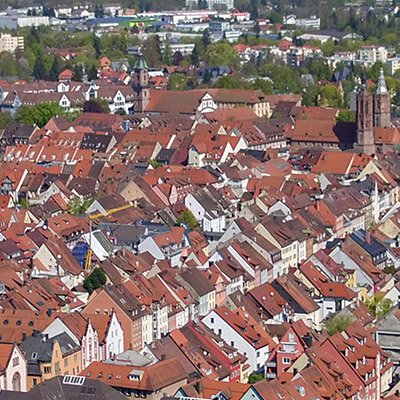
Climate protection
The effects of climate change can be observed everywhere. Climate change and global warming - at least since scorching summer heat, mild winters, floods, heavy rainfall and hurricanes have become more frequent - are these two words on everyone's lips. Above all, greenhouse gases from transport, energy and heat production and from industry are making a major contribution to climate change.
It is therefore essential to protect the climate and implement a common climate policy.
Worldwide, the average temperature has already risen by around 0.74 degrees Celsius in the last 100 years. The global goal is to limit global warming to less than 2 degrees Celsius compared to the pre-industrial age in order to avert dramatic consequences for the earth. This was laid down in the Paris Convention, an agreement of 195 parties to the United Nations Framework Convention on Climate Change (UNFCCC) with the aim of protecting the climate in succession to the Kyoto Protocol.
The Paris Convention entered into force on November 4, 2016, 30 days after 55 countries, which also account for at least 55% of emissions, had completed ratification. On November 3, 2016, one day before the agreement came into force, a total of 92 states had ratified the agreement. In addition, 163 states had drawn up climate protection plans. For the Federal Republic of Germany, this is the Climate Protection Plan 2050 with a long list of politically controversial individual measures.
In addition to the national and international level, the state of Baden-Württemberg and its cities and municipalities also play a central role, as urban areas are considered one of the main causes of global warming.
The Climate Protection Act BW, which came into force in 2013, provides binding targets for the reduction of greenhouse gases. In order to achieve these goals, the state government has developed an integrated energy and climate protection concept with concrete strategies and has set itself a role model. The Climate Protection Act is currently being amended.
For the consequences of climate change, which are already being felt today, the state government of Baden-Württemberg has developed an adaptation strategy for 2015.
The industrial region of Baden-Württemberg contributes disproportionately to the increase in climate-damaging greenhouse gases. In order to keep the resulting climate change at a manageable level, we must reduce CO2 emissions.
According to the climate protection concept, the state's CO2 emissions are to be reduced by 90 percent by the year 2050 compared to 1990. The municipalities and districts act as role models for their inhabitants in the field of climate protection and energy efficiency and can play a major role in shaping the framework conditions for the greenhouse gas emissions caused in their area.
The city of Villingen-Schwenningen has therefore declared a climate emergency in 2019 and at the same time joined the climate protection pact of the state of Baden-Württemberg. The city of Villingen-Schwenningen has thus committed itself to the 1.5 degree target. The Climate Protection Pact BW with the municipal state associations serves to implement the legal mandate for action of the Climate Protection Act.
So far 284 municipalities have joined the climate protection pact. In doing so, they make it clear that they are active in climate protection and that they want to develop these activities further. Municipalities that support the BW Climate Protection Pact have the opportunity to receive an increased funding quota under the Climate Protection Plus and CLIMATE PASS funding programs.
Furthermore, the city of Villingen-Schwenningen has agreed to carry out the European Energy Award, or eea for short, in 2019. This is a European quality certificate for the sustainability of the energy and climate protection policy of municipalities.
In the meantime, more than 1500 municipalities across Europe with about 50 million inhabitants are involved, and more than 800 municipalities are certified (status 2018).